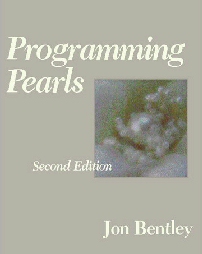
|
FreeComputerBooks.com
Links to Free Computer, Mathematics, Technical Books all over the World
|
|
- Title Programming Pearls, 2nd Edition
- Author(s) Jon Bentley
- Publisher: Addison-Wesley Professional; 2 edition (October 7, 1999)
- Hardcover/Paperback 256 pages
- eBook PDF, ePub, Kindle, etc.
- Language: English
- ISBN-10: 0201657880
- ISBN-13: 978-0201657883
- Share This:

|
This book is a collection of essays about a glamorous aspect of software: programming pearls whose origins lie beyond solid engineering, in the realm of insight and creativity. This book provides a guide for both students and experienced programmers about how to design and create programs, and how to think about programming.
The book is full of small case studies, real examples, and interesting exercises for learning about how to program. This web page contains samples from the whole work for you to investigate. For teachers, the links below lead to some of the central material suitable for classroom use.
Completely revised and brought up to date with all new code examples in C and C++, this book remains an exceptional tutorial for learning to think like a programmer.
About the Authors Reviews, Ratings, and Recommendations: Related Book Categories:- Computer Programming
- C and Objective-C
- C++ Programming
- Software Design Patterns
- Software Engineering Principles and Practices
 Similar Books
Similar Books
-
 A Practical Theory of Programming (Eric C.R. Hehner)
A Practical Theory of Programming (Eric C.R. Hehner)
This book explores aspects of programming that are amenable to mathematical proof. The author describes a programming theory which is much simpler and more comprehensive than the current theories to date.
-
 Structure and Interpretation of Computer Programs using JavaScript
Structure and Interpretation of Computer Programs using JavaScript
This book introduces the reader to central ideas of computation by establishing a series of mental models for computation. It has had a dramatic impact on computer science curricula over the past decades. Examples are implemented using the JavaScript.
-
 How to Design Programs: An Introduction to Programming
How to Design Programs: An Introduction to Programming
This introduction to programming places computer science at the core of a liberal arts education. Unlike other introductory books, it focuses on the program design process, presenting program design guidelines.
-
 Elements of Programming (Alexander Stepanov, et al)
Elements of Programming (Alexander Stepanov, et al)
The book shows that algorithms implemented in a real programming language, such as C++, can operate in the most general mathematical setting. For example, the fast exponentiation algorithm is defined to work with any associative operation.
-
 Isomorphism - Mathematics of Programming (Xinyu Liu)
Isomorphism - Mathematics of Programming (Xinyu Liu)
This book introduces the mathematics behind computer programming. It intents to tell: programming is isomorphic to mathematics. Just like in art and music, there are interesting stories and mathematicians behind the great minds.
-
 Competitive Programmer's Handbook (Antti Laaksonen)
Competitive Programmer's Handbook (Antti Laaksonen)
The purpose of this book is to give you a thorough introduction to competitive programming. It is assumed that you already know the basics of programming, but no previous background in competitive programming is needed.
-
 What Every Programmer Should Know About Memory
What Every Programmer Should Know About Memory
This document explains the structure of memory subsystems in use on modern commodity hardware, illustrating why CPU caches were developed, how they work, and what programs should do to achieve optimal performance by utilizing them.
-
 Answer Set Programming (Vladimir Lifschitz)
Answer Set Programming (Vladimir Lifschitz)
This book book will introduce the reader to the theory and practice of Answer Set Programming (ASP). It will include numerous examples of ASP programs and present the mathematical theory that ASP is based on, and exercises with complete solutions.
-
 Aesthetic Programming: A Handbook of Software Studies
Aesthetic Programming: A Handbook of Software Studies
The book explores the technical as well as cultural imaginaries of programming from its insides, introduces and demonstrates the reflexive practice of aesthetic programming, engaging with learning to program as a way to understand and question.
-
 Principles of Algorithmic Problem Solving (Johan Sannemo)
Principles of Algorithmic Problem Solving (Johan Sannemo)
The algorithmic approach to solving problems in computer technology is an essential tool. This book presents a readable, entertaining, and energetic book that will motivate and challenge students to open their minds to the algorithmic nature of problem solving.
-
 Structure and Interpretation of Computer Programs, 2nd Edition
Structure and Interpretation of Computer Programs, 2nd Edition
This book has had a dramatic impact on computer science curricula over the past decade. This long-awaited revision contains changes throughout the text. Examples are implemented using the Scheme dialect of Lisp.
-
 The Black Art of Programming (Mark McIlroy)
The Black Art of Programming (Mark McIlroy)
This book is an introduction to computer programming. It covers the essential information of a Computer Science course. It is recommended for beginners and intermediate programmers.
-
 Exploratory Programming for the Arts and Humanities
Exploratory Programming for the Arts and Humanities
This book introduces programming to readers involved with the arts and humanities; there are no prerequisites, and no previous knowledge of programming is assumed. It reveals programming can also be a tool for sketching, brainstorming, and inquiry.





